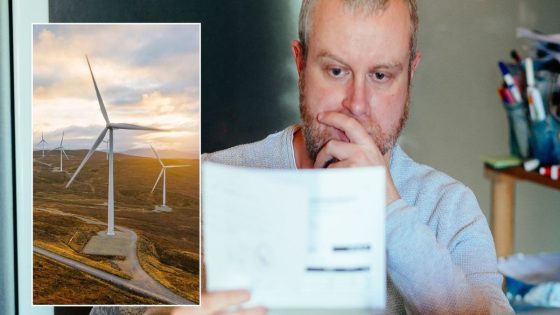Heat pumps powered by community energy schemes using wind turbines could slash household bills by more than a quarter compared to gas, a report has found.
Heating systems using electric heat pumps, primarily powered by local onshore turbines, might see families save 26 per cent on their energy bills than if they continued using gas heating.
If solar panels and batteries and installed in households, energy bills could be cut by as much as 31 per cent, according to the study by climate campaign group Possible and energy experts Regen.
The report examined the upfront and running costs of a wind power and heat pump system to 2,000 homes paired with a two megawatt (MW) community onshore wind turbine.
Do you have a money story you’d like to share? Get in touch by emailing [email protected].
New research suggests heat pumps and wind turbines will bring down energy bills significantly
GETTY
It found that wind and heat projects could be cheaper than continuing with gas boilers, with the 26 per cent reduction in energy bills being based on the gas price cap for 2023.
Furthermore, the study revealed that these projects would reduce carbon emissions by up to 90 per cent compared to gas heating and safeguard families from volatile prices.
Possible and Regan argue that community-owned wind farms would also generate revenues and benefits for local areas.
Some 3,700 of the most deprived neighbourhoods in England are within one kilometre (0.6 miles) of an area of proficient wind power sources which could reduce fuel poverty.
Despite these findings, the campaigners are calling for urgent changes due to heat pumps being more expensive to run than gas boilers.
In recent years, the Government has launched various initiatives such as the Boiler Upgrade Scheme but analysts have questioned whether this level of support goes far enough.
Among the activists’ suggestions for reform include an overhaul of the restrictive planning regime, which prevents new onshore wind projects, and more lost-cost financial support for communities to get projects up and running.
Alethea Warrington, a senior campaigner at Possible, explained: “Powering clean heat with clean, cheap, local energy is the ultimate win-win: lower bills, lower emissions and warm homes.
 Soaring energy bills have been an ongoing issue for families GETTY
Soaring energy bills have been an ongoing issue for families GETTY
Now the Government needs to remove the barriers stopping communities – and our climate – from benefiting from clean, secure and affordable heat.”
Rebecca Windemer, a planning and communities lead at Regen and one of the report’s co-authors, added: “We know that we need to go much further and faster on clean heat to hit our net zero targets, and our report gives the Government the keys to a real solution.
“By innovating with wind, solar and clean heat technology, we can slash bills while cutting carbon.
“We desperately need policy change to enable communities to directly benefit from these projects.”
Source Agencies




